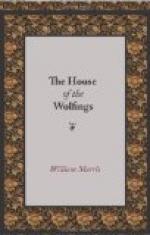Tall and for the most part comely were both men and women; the most of them light-haired and grey-eyed, with cheek-bones somewhat high; white of skin but for the sun’s burning, and the wind’s parching, and whereas they were tanned of a very ruddy and cheerful hue. But the thralls were some of them of a shorter and darker breed, black-haired also and dark-eyed, lighter of limb; sometimes better knit, but sometimes crookeder of leg and knottier of arm. But some also were of build and hue not much unlike to the freemen; and these doubtless came of some other Folk of the Goths which had given way in battle before the Men of the Mark, either they or their fathers.
Moreover some of the freemen were unlike their fellows and kindred, being slenderer and closer-knit, and black-haired, but grey-eyed withal; and amongst these were one or two who exceeded in beauty all others of the House.
Now the sun was set and the glooming was at point to begin and the shadowless twilight lay upon the earth. The nightingales on the borders of the wood sang ceaselessly from the scattered hazel-trees above the greensward where the grass was cropped down close by the nibbling of the rabbits; but in spite of their song and the divers voices of the men-folk about the houses, it was an evening on which sounds from aloof can be well heard, since noises carry far at such tides.
Suddenly they who were on the edges of those throngs and were the less noisy, held themselves as if to listen; and a group that had gathered about a minstrel to hear his story fell hearkening also round about the silenced and hearkening tale-teller: some of the dancers and singers noted them and in their turn stayed the dance and kept silence to hearken; and so from group to group spread the change, till all were straining their ears to hearken the tidings. Already the men of the night-shift had heard it, and the shepherds of them had turned about, and were trotting smartly back through the lanes of the tall wheat: but the horse-herds were now scarce seen on the darkening meadow, as they galloped on fast toward their herds to drive home the stallions. For what they had heard was the tidings of war.
There was a sound in the air as of a humble-bee close to the ear of one lying on a grassy bank; or whiles as of a cow afar in the meadow lowing in the afternoon when milking-time draws nigh: but it was ever shriller than the one, and fuller than the other; for it changed at whiles, though after the first sound of it, it did not rise or fall, because the eve was windless. You might hear at once that for all it was afar, it was a great and mighty sound; nor did any that hearkened doubt what it was, but all knew it for the blast of the great war-horn of the Elkings, whose Roof lay up Mirkwood-water next to the Roof of the Wolfings.
So those little throngs broke up at once; and all the freemen, and of the thralls a good many, flocked, both men and women, to the Man’s-door of the hall, and streamed in quietly and with little talk, as men knowing that they should hear all in due season.




